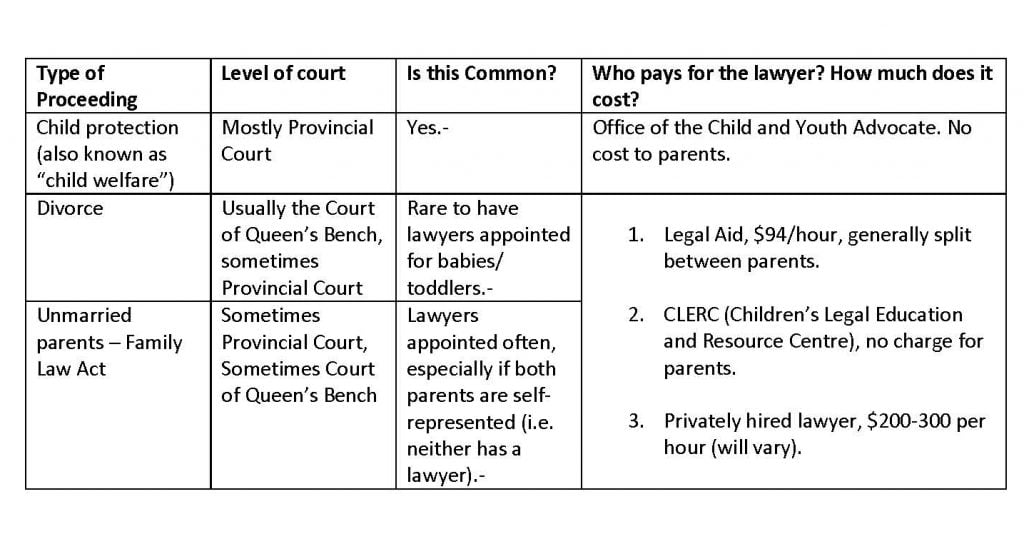 Until you face a family law issue, you may never know that your pre-verbal children, who have not yet learned to speak, can have a lawyer appointed to represent them with or without your consent. Lawyers are routinely appointed through Office of the Child and Youth Advocate, for children and youth, including infants, who are involved in child protection matters in Alberta. The consent of parents is not necessarily required in these instances. A lawyer may be appointed for children and youth who are involved in divorce proceedings or family law proceedings, if their parents agree to it, or if a judge orders it.
Until you face a family law issue, you may never know that your pre-verbal children, who have not yet learned to speak, can have a lawyer appointed to represent them with or without your consent. Lawyers are routinely appointed through Office of the Child and Youth Advocate, for children and youth, including infants, who are involved in child protection matters in Alberta. The consent of parents is not necessarily required in these instances. A lawyer may be appointed for children and youth who are involved in divorce proceedings or family law proceedings, if their parents agree to it, or if a judge orders it.
The process is slightly different in different situations. The table below explains when a lawyer may be appointed and the cost associated:

Why Should My Baby Have A Lawyer?
Canada is a signatory to the United Nations Convention on the Rights of the Child. Among other things, Canada has agreed all children have a right to:
- be treated with fairness and respect;
- life, health, education and development;
- have adults care for them and act in their best interests; and
- respect and consideration of their views.
How are these rights ensured for a pre-verbal child in a family law matter?
Generally, for a pre-verbal client like a baby or toddler, the courts will appoint a lawyer to be a “friend of the court”, or the lawyer may choose to take that role. The rights and interests of parents are not always the same as the rights and interests of their infants. Because of the rapid pace of development in the early years, and because early development sets the stage for life-long health and well-being, the infant has urgent needs. Specifically, infants need a chance to form a relationship with a consistent nurturing and sensitive caregiver, predictable routines, and protection from too much stress. A lawyer can represent the rights of infants and ensure their needs are carefully considered in the resolution of disputes.
The role of a lawyer for infants and toddlers varies, depending on several factors. Generally, for a pre-verbal client like a baby or toddler, the courts will appoint a lawyer to be a “friend of the court”, or the lawyer may choose to take that role. The lawyer’s job will be to present relevant information to allow the judge to base decisions on what is in the baby’s best interests.
In most situations, you should expect your baby’s lawyer:
- will meet your baby, generally at your baby’s home;
- will stay independent of the parents’ wishes; and
- will objectively present evidence that could assist the judge in determining what is in the best interest of the baby.
In child protection proceedings, the lawyer will advocate on behalf of the infant to ensure there are no unreasonable delays.
Infant Development and the Court
Child development can be thought of as the baby’s job, and can be thought of in three parts: 1) babies must quickly learn how to engage in close emotional relationships; 2) as they grow, children learn how to explore and discover their environment; and 3) young children must gradually learn how to focus their attention, constrain their impulses and to manage strong feelings. Infants and toddlers rely on consistent, predictable and nurturing care, predictable routines, and stable environments to do this job properly.
The rights and interests of parents are not always the same as the rights and interests of their infants. It is the daily, minute and seemingly inconsequential interactions between an infant and her trusted caregivers that allow her development to unfold properly – think of the ‘serve and return’ of a tennis game. The baby initiates an interaction (serve) and the caregiver responds (return). Children who are distressed cease this type of interaction and instead become preoccupied with seeking comfort and soothing. Separations from the preferred attachment figure can deprive the infant of her most reliable and effective source of comfort. If an infant is regularly disrupted from her routines, and is repeatedly having to cope with separations from, and reunions with, her primary attachment figure, it will make her ‘job’ of healthy development much harder to do.
Stress in early childhood is far more damaging than stress exposure at any other period of development; so much so that researchers use the term ‘toxic stress’ to describe chronic, unmanageable stress exposure occurring early in life. This is because the toddler’s brain is still immature, including the part of the brain responsible for emotional regulation and for triggering the stress response (the limbic system). Some stress is unavoidable, even helpful to development; the stress of vaccinations is an example. The impact of stress on the young child depends on how controllable the stress is, how often and for how long the body’s stress response system is activated, and whether the child has familiar, safe caregivers to turn to for support.
Lawyers are routinely appointed through Office of the Child and Youth Advocate, for children and youth, including infants, who are involved in child protection matters in Alberta. If a baby’s stress response endures prolonged or chronic activation while it is still maturing, it can delay or prevent healthy brain development and interfere with the development of the stress response system itself. This leaves the baby less equipped to handle life’s adversities later. In other words, toxic stress affects the adult brain; toxic stress organizes the infant brain. Entry into foster care or the disruptions associated with being raised in two homes present special challenges for infants, and for the courts who must weigh these concerns against the interests, needs and preferences of parents.
Tips for Promoting Mental Health in Infants
If you are in a custody conflict or are involved in a child protection matter, the following tips can help protect your baby’s mental health:
- take steps to reduce the stress in your household wherever possible – your stress is your baby’s stress;
- reduce the conflict with your parenting partner(s) whenever you can– whether it is a foster parent, ex-spouse, step-parent or other person, conflict is stressful for you and your baby, and it can be toxic to your child’s developing brain. Very often, the stress associated with adult conflicts is more damaging than the issues in dispute;
- forget about purchasing expensive (and overstimulating) toys that flash and beep. Spend some quiet time every day with your infant – on the floor, one-to-one, and engaged in a playful activity. You are the best toy in the room! Frequent contact between parents and infants in foster care is essential to preserve important attachment ties; and
- try to duplicate routines for infants transferring between two households, and make the transitions smooth by keeping a very predictable schedule/location. Avoid conflict at transitions by using a communication book or on-line communication tools such as Our Family Wizard.
You may request a qualified infant mental health professional to assess your baby or toddler. These professionals can provide childhood mental health assessments and consultations to help parents create developmentally-sensitive parenting plans. They can work with mediators and family lawyers to help the parents consider the developmental and emotional needs of infants and toddlers in shared parenting arrangements. Furthermore, they can offer valuable insight to judges on what factors should be considered in making decisions regarding your baby or toddler.
Conclusion
If you are involved in a child protection matter, it always advisable to consult a lawyer. Find somebody who has experience dealing with child protection matters. Legal Aid coverage may be available to you. Alternatively, are many sources of legal advice depending on the community in which you live. Contact your provincial Law Society for information and assistance.
The same can be said for parents that are separating. Get some legal advice, especially from somebody who has experience dealing with custody matters. There are excellent resources out there to help educate parents so that they can protect children from a stressful separation.
Lawyers and mental health professionals working with matters involving infants or young children should have specialized training and experience.
Resources
Alberta Family Wellness Initiative http://www.albertafamilywellness.org
Circle of Security https://www.circleofsecurityinternational.com

